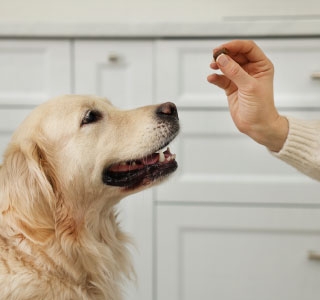- text
-
† Offer available to new Everyday Pet Insurance policyholders, and is limited to 1 membership per eligible policy. The free membership offer (valued at $199p.a) is from the date of your policy commencement, provided your Everyday Pet Insurance policy remains active. You are not eligible to redeem the free membership subscription for cash or credit. VetAssist is a separate subscription based service to the Everyday Pet Insurance product, and is provided independently by Everyday Insurance third party service provider, VetChat Services Pty Ltd (VetChat). Click here for full VetAssist Service terms and conditions. Everyday Insurance reserves the right to vary or remove this offer at any time and will provide reasonable notice of any such changes.
Puppy feeding guide.
Puppies have unique dietary requirements compared to adult dogs, which is essential to support them as they undergo rapid growth and development during their early months. Here, we dive into puppy nutrition, providing essential insights for you to ensure your furry friend receives the nourishment they need to thrive during their formative years.
From understanding breed-specific requirements to determining portion sizes and feeding frequencies, we'll cover everything you need to know to raise a healthy and happy puppy.
Breed-Specific Nutritional Needs:
Understanding your puppy's breed and size is crucial for tailoring their diet to support optimal growth and skeletal development.
Important for all - but when compared to smaller breeds, it’s especially essential that larger breeds, such as German Shepherds and Great Danes, are kept in a lean body condition as they grow. An overweight body condition during growth is an important risk factor for developmental orthopedic disease.
Nutritional Considerations:
Puppies do have specific nutritional considerations that are different to that of an adult. Primarily, they have different requirements for important minerals such as calcium and phosphorus, and, typically, a higher calorie requirement than an adult dog who is a similar size.
Commercial puppy foods, that are formulated to be balanced, remove the need for you to do the hard work. They are tested to provide the precise balance of protein, carbohydrates, fats, vitamins, and minerals that puppies need for healthy growth and development.
As long as it is balanced - whether you choose wet or dry food is largely a matter of preference.
It's essential to select high-quality puppy food to ensure optimal digestibility and nutrient absorption, as lower-quality diets may contribute to weight gain, skin and digestive issues.
Determining Portion Sizes:
Most commercial puppy foods come with a feeding guide based on your pet's weight, and age.
While this serves as a useful starting point, every puppy is unique, and their energy requirements may vary based on metabolism and activity level. Monitor your puppy's hunger cues and body condition to determine whether you should adjust their food intake.
A thin layer of fat over the ribs and a slight waistline are indicators of optimal body condition for growing puppies. Consult with your veterinarian if you're unsure about your puppy's weight and condition.
Feeding Frequency:
Puppies have higher metabolic rates than adult dogs and need to eat more frequently to maintain energy levels. It's recommended to feed puppies approximately three times daily until they are around four to six months old, depending on their breed.
After this period, you can transition to feeding them twice a day, with the option of incorporating a smaller midday feed for mental stimulation. Consistent feeding schedules help regulate metabolism and prevent blood sugar fluctuations, reducing the risk of health issues like low blood sugar.
Training and Additional Feeding:
Training is an essential aspect of puppy development, and treats are often used as rewards. When calculating your puppy's daily food requirements, remember to account for treats given during training sessions. You can use a portion of your puppy's regular food for training purposes to ensure they receive balanced nutrition while rewarding good behaviour. Splitting their daily food allowance into multiple meals and incorporating food-based puzzle toys can provide mental stimulation and prevent overfeeding.
By following this feeding guide, you can provide your puppy with the nutrition they need to grow into a healthy and happy adult dog. Remember to consider your puppy's breed-specific requirements, monitor their body condition, and consult with your veterinarian for personalised advice.
Related articles.
- text
-
Everyday Pet Insurance policies entered into for the first time prior to 17 July 2023 and subsequent renewals of those policies are issued by The Hollard Insurance Company Pty Ltd ABN 78 090 584 473, AFSL 241436 (Hollard), arranged and administered by PetSure (Australia) Pty Ltd ABN 95 075 949 923, AFSL 420183 (PetSure) and promoted and distributed by Hollard’s Authorised Representative (AR) Woolworths Group Limited ABN 88 000 014 675, AR 245476 (Woolworths).
Everyday Pet Insurance policies entered into for the first time on or after 17 July 2023 and subsequent renewals of those policies are issued by PetSure and promoted and distributed by PetSure’s AR, Woolworths.
Any advice provided is general only and does not take into account your individual objectives, financial situation or needs. Please consider the Product Disclosure Statement (PDS) to ensure this product meets your needs before purchasing, or choosing to continue with the product. PDS and Target Market Determination available at insurance.everyday.com.au/pet-insurance.





